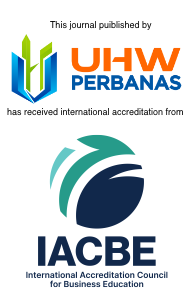Beware of the existence of a big bath with asset impairment after pandemic covid-19!
DOI:
https://doi.org/10.14414/tiar.v11i1.2243Keywords:
Assets impairment, a big bath accounting, earnings management, lossAbstract
This study attempts to investigate the relationship between big bath accounting and asset impairment. It used the sample consisting of 231 firm-year observations from 33 mining companies listed on the Indonesia Stock Exchange during the 2012 to 2018 period. Logistic regression has been used to analyze a big bath accounting on assets impairment. The results provide evidence that companies that tend to do a big bath accounting will recognize a loss of asset value. A big bath accounting is done because managers assume that investors will respond when the company suffered large losses or small losses. The manager acknowledges the costs of future periods and current period losses when unfortunate unavoidable circumstances in the current period. It will consequently make a profit higher than expected in the next year. In the next period, the company’s performance will look better so that managers can maximize utility in the form of compensation for the targets that have been achieved.
References
Abrigo, L. K. C. and C. Ferrer, R. (2016) ‘The Effect of Management Compensation and Debt Requirements on Earnings Management Concerning The Impairment of Assets’, Jurnal Akuntansi dan Investasi, 17(1), pp. 1–21. doi: 10.18196/jai.2016.0041.1-21.
Agustia, D. (2013). Pengaruh free cash flow Dan kualitas audit terhadap manajemen laba. AKRUAL: Jurnal Akuntansi, 4(2), 105–118. https://doi.org/ISSN 2502-6380
Andersson, S. (2014). Application of IAS 36 - Impairment of fixed assets (University of Gothenburg). Retrieved from https://gupea.ub.gu.se/bitstream/2077/36044/1/gupea_2077_36044_1.pdf
Andrews, R. (2012). Fair Value, Earnings Management and Asset Impairment: The Impact of a Change in the Regulatory Environment. Procedia Economics and Finance, 2(Af), 16–25. https://doi.org/10.1016/s2212-5671(12)00060-3
Athanasakou, V., & Hussainey, K. (2014). The perceived credibility of forward-looking performance disclosures. Accounting and Business Research, 44(3), 227–259. https://doi.org/10.1080/00014788.2013.867403
Athanasakou, V., Strong, N. C., & Walker, M. (2010). The market reward for achieving analyst earnings expectations: does managing expectations or earnings matter? Journal of Business Finance and Accounting, 38(258–94).
Ayedh, A. M., Fatima, A. H., & Mohammad, M. H. S. (2019). Earnings management in malaysian companies during the global financial crisis and the coincidental effect of IFRS adoption. Australasian Accounting, Business and Finance Journal, 13(1), 4–26. https://doi.org/10.14453/aabfj.v13i1.2
Bepari, K., Sheikh, F. R., & Abu, T. M. (2014). Firms’ compliance with the disclosure requirements of IFRS for goodwill impairment testing: Effect of the global financial crisis and other firm characteristics. Journal of Accounting & Organizational Change, 10(1), 116–149. https://doi.org/10.1108/JAOC-02-2011-0008
Broberg, P., Collin, S.-O., Tagesson, T., Axelsson, M., & Schele, C. (2011). Why reduce profit? Accounting choice of impairments in Swedish listed corporations. International Journal of Accounting and Finance, 3, 49–71. https://doi.org/10.1504/IJAF.2011.042220
Chen, S. C., Li, S.-H., & Li, C.-Y. (2011). Recent Related Research in Technology Acceptance Model: A Literatur Review. Australian Journal of Business and Management Research, 1(9), 124–127. https://doi.org/10.16194/j.cnki.31-1059/g4.2011.07.016
Cheng, Q., & Warfield, T. (2005). Equity incentives and earnings management. Accounting Review, 80(2), 441–476.
Cheng, Q., Warfield, T., & Minley, Y. (2011). Equity incentives and earnings management : Evidence from the banking industry. Journal of Accounting, Auditing and Finance, 26(2), 317–349. Retrieved from https://ink.library.smu.edu.sg/soa_research/824
Cheng, Y., Park, J., Pierce, S., & Zhang, T. (Tim). (2019). Big Bath Accounting Following Natural Disasters. SSRN Electronic Journal. https://doi.org/10.2139/ssrn.3305478
Dai, D., Mao, X., & Deng, F. (2007). A research on impairment of assets in listed firms with negative earnings in China. Frontiers of Business Research in China, 1(3), 351–364. https://doi.org/10.1007/s11782-007-0020-1
Dudycz, T., & Praźników, J. (2020). Does the mark-to-model fair value measure make assets impairment noisy?: A literature review. Sustainability (Switzerland), 12(4). https://doi.org/10.3390/su12041504
Duru, K., & Alexandros Tsitinidis. (2013). Managerial Incentives and Earnings Management: An Empirical Examination of the Income Smoothing in the Nordic Banking Industry. UPPSALA UNIVERSITY.
Gonçalves, C., Ferreira, L., Rebelo, E., & Fernandes, J. S. (2019). Big bath and goodwill impairment. Revista Brasileira de Gestao de Negocios, 21(2), 312–331. https://doi.org/10.7819/rbgn.v21i2.3977
Grace, K., & Ambrose, J. (2013). Institutional Investors ’ Perceptions on Quality of Financial Reporting in Kenya. 3(21), 144–156.
Hassine, N. M., & Jilani. (2017). Earnings Management Behavior with Respect to Goodwill Impairment Losses under IAS 36: The French Case. International Journal of Academic Research in Accounting, Finance and Management Sciences, 7(2), 177–196. https://doi. org/10.6007/ijarafms/v7-i2/2993
Hope, O. K., & Wang, J. (2018). Management deception, big-bath accounting, and information asymmetry: Evidence from linguistic analysis. Accounting, Organizations and Society, 70(April 2017), 33–51. https://doi. org/10.1016/j.aos.2018.02.004
Jordan, C. ., & Clark, S. . (2004). Big Bath Earnings Management : The Case of Goodwill Impairment Under SFAS No. 142. Journal Of Applied Business Research, 20(2), 63–70.
Karlsson, C., & Reimbert, A. (2016). Big Bath and Impairment of Goodwill – A study of the European telecommunication industry. Jonkoping University.
Kirschenheiter, M., & Melumad, N. D. (2002). Can “Big Bath†and Earnings Smoothing Co-Exist as Equilibrium Financial Reporting Strategies? Journal of Accounting Research, 40(3), 761–796.
Kustono, A. S., & Effendi, R. (2016). Earnings Management and Corporate Governance Case in Indonesia. Advanced Science Letters, 22(12), 4345– 4347. https://doi.org/https://doi. org/10.1166/asl.2016.8147
Kusumawatil, E., Trisnawati, R., & Mardalis, A. (2015). Pengaruh good governance terhadap manajemen laba. The 2nd University Research Coloquium 2015, 339–350.
Laskaridou, E. C., Athanasios, V., & Stergios, A. (2014). Detecting asset impairment earnings management on IFRS context: Some evidence from greek listed companies. American Journal of Applied Sciences, 11(6), 963–968. https://doi. org/10.3844/ajassp.2014.963.968
Laskaridou, E. C., & Vazakidis, A. (2013). Detecting Asset Impairment Management: Some Evidence from Food and Beverage Listed Companies. Procedia Technology, 8(Haicta), 493– 497. https://doi.org/10.1016/j. protcy.2013.11.065
Laskaridou, E., Vazakidis, A., & Stergios, A. (2014). Detecting asset impairment earnings management on IFRS context: Some evidence from greek listed companies. American Journal of Applied Sciences, 11, 963–968. https:// doi.org/10.3844/ajassp.2014.963.968
Ozili, P. K. (2020). Accounting and Financial Reporting during a Pandemic. SSRN Electronic Journal. https://doi. org/10.2139/ssrn.3613459
Rossi, P. R. (2014). Earnings management in India. CFA Digest, 44(3). https://doi. org/10.2469/dig.v44.n3.7
Scott, W. R. (2012). Financial Accounting Theory (6th ed.). Toronto Kanada: Toronto Pearson Prentice.
Shapiro, S. P. (2005). Agency Theory. Annual Review of Sociology, 31, 263–284. https://doi.org/https:// d o i . o r g / 1 0 . 1 1 4 6 / a n n u r e v . soc.31.041304.122159
Siggelkow, L., & Zülch, H. (2013). What Drives Companies? An Analysis of Fixed Asset Write-Offs in Europe in the Context of Different Institutional Settings. SSRN Electronic Journal, (115). https://doi.org/10.2139/ ssrn.2198809
Sooriyakumaran, L. (2014). Analysis of Impairment of Assets and its Impact on Capital Structure of the Listed Manufacturing Companies in Sri Lanka. SSRN Electronic Journal, 1–10. https://doi.org/10.2139/ ssrn.2405376
Stenheim, T., & Madsen, D. (2016). Goodwill impairment losses, economic impairment, earnings management and corporate governance. 11-30, 16(1996), 11–30.
Watts, J. L., & Zimmerman, R. L. (1990). Positive Accounting Theory. The Accounting Review, 65(1), 131–156. Retrieved from https://www.jstor. org/stable/247880
Downloads
Additional Files
Submitted
Published
How to Cite
Issue
Section
License
Copyright (c) 2021 The Indonesian Accounting Review

This work is licensed under a Creative Commons Attribution-NonCommercial 4.0 International License.

















